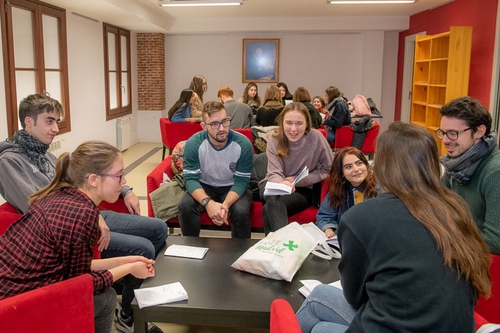Commented Bible Passages
June
John the Baptist announced, “One stronger than I am is coming after me. I’m not even worthy to bend over and loosen the strap of his sandals. I baptize you with water, but he will baptize you with the Holy Spirit.” About that time, Jesus came from Nazareth of Galilee, and John baptized him in the Jordan River. While he was coming up out of the water, Jesus saw heaven splitting open and the Spirit, like a dove, coming down on him. And there was a voice from heaven: “You are my Son, whom I dearly love; in you I find happiness.”
Jesus’ baptism foreshadows what we will find in the rest of the Gospel account: the manifestation of Jesus as God’s beloved Son, animated in everything by the Holy Spirit. Far from the Temple, the Scripture scholars and the leaders of the people, Jesus approaches among the crowd of penitents. He reaches out to those who have no other recourse than God’s mercy. Without privilege, he became one with them and was baptised like them. This anticipates his total commitment.
When Jesus rises from the water, three signs converge to reveal the meaning of the event: first, anticipating the Temple veil that will be torn at Jesus’ death, the heavens open. In Jesus, all distance between God and man is abolished. Secondly, without forcing or affecting his person, the Spirit descends on Jesus to guide him in every situation. Free of all personal plans, Jesus fully embraces the will of God. Finally, Jesus receives the knowledge that he is the beloved Son, the joy of the Father. This intimacy with the Father is the source from which Jesus draws the impetus to carry out his ministry. He has no other plan or project than to accept all God’s hope and to devote himself to it with all his heart. He will be the definitive ‘yes’ to God’s expectation, incarnate in a human existence. This communion between the Father and the Son is already the realisation of the Kingdom of God that is coming to the world.
To recognise Jesus as the only Son loved by God is to discover a God who is Father, a God who is not self-sufficient or self-satisfied, but who awaits his joy from another. Because he bases his relationship on love, God places a limit on his own omnipotence and all-knowing: God cannot answer for me and does not know in advance how I will answer! But God will never stop believing in me. God gives out of love, that is, without imposing anything, but with the hope that the intention that drives him will be recognised and that this will elicit a response inspired by a similar courage: a total and free commitment of my whole life.
![]() What does it mean for me when I remember that Jesus was both fully human and fully God ?
What does it mean for me when I remember that Jesus was both fully human and fully God ?![]() How can I welcome the will of God without my own plans becoming a hindrance?
How can I welcome the will of God without my own plans becoming a hindrance?![]() If God leaves me free, how can I better use this freedom ?
If God leaves me free, how can I better use this freedom ?
 TAIZÉ
TAIZÉ